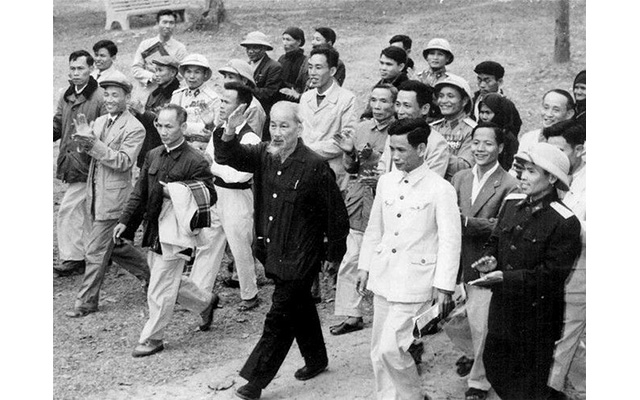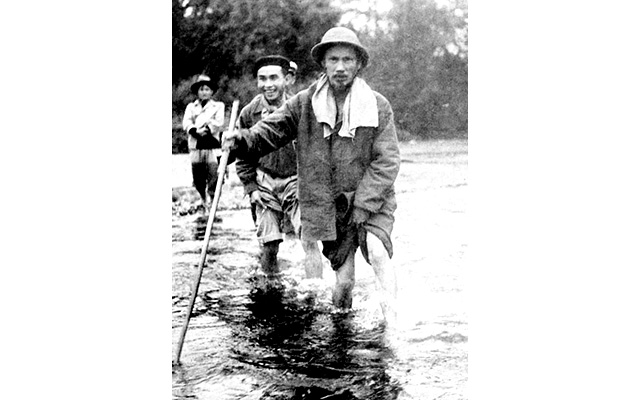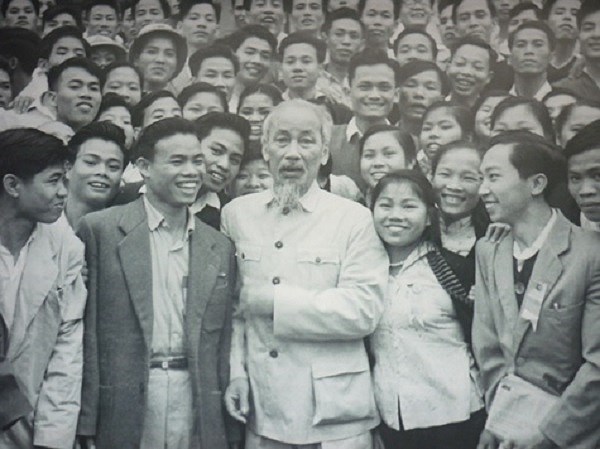The greatest ambition of Ho Chi Minh, the great hero of liberation of the Vietnamese people in the new era, was for the Fatherland to be liberated and for the people to be free and happy. In January 1946, when answering foreign journalists as the President of the Government, he said:
“I absolutely do not desire fame and fortune at all. Now I have to take on the position of President because my compatriots have entrusted me, so I must try my best, just like a soldier obeying the nation's orders to go to the front. When my compatriots let me retire, I will gladly retire. I have only one desire, an utmost desire, which is to make our country completely independent, our people completely free, everyone has food to eat, clothes to wear, and everyone can go to school”2.
 President Ho Chi Minh visited Vinh Phuc in 1963
President Ho Chi Minh visited Vinh Phuc in 1963
That greatest ambition was the driving force that pushed Ho Chi Minh to venture into the paths of many countries in the world to survey and learn about revolutionary theories and experiences in order to build a comprehensive system of viewpoints on the Vietnamese revolution, meeting the development requirements of the nation and in line with the evolutionary trend of humanity in the new era. Ho Chi Minh's revolutionary viewpoint system is the inheritance and development to a new height of the traditional spiritual values of ideology and culture of the nation, combined with the selection, synthesis and dialectical development of the values of Eastern cultural ideology, the cultural ideology of the European and American revolutions in the 17th and 18th centuries and especially the revolutionary doctrine of Marx and Lenin. That system of revolutionary ideological viewpoints has the historical stature of a doctrine of liberation and development for independence and freedom.
Implementing Ho Chi Minh's doctrine of independence and freedom in a country that was originally a colony, had a backward agricultural economy, poor industry, and a population mainly made up of farmers must take place over a long period of time, and in general, must be carried out through three successive revolutionary strategies, first of all, the national liberation revolution, through the people's democratic revolution, creating the premise for transition to socialism. To achieve victory for that revolutionary cause, first of all, there must be a revolutionary party armed with a creative revolutionary doctrine as the ideological basis and compass for revolutionary action, with a scientific revolutionary platform and line built in accordance with the history, country, and people of Vietnam, and the party must be scientifically and tightly organized, especially there must be a team of Party members with revolutionary ideals and ethics, steadfastly fighting for the interests of the Fatherland and the people.
The issue of revolutionary ethics of the Party members is related to the leadership role of the Party and the success or failure of the revolution. Ho Chi Minh once emphasized: Just like a river must have a source to have water, without a source the river will dry up. A tree must have roots, without roots the tree will wither. A revolutionary must have ethics, without ethics, no matter how talented he is, he cannot lead the people. Therefore, right from the time of preparing and founding the Party and throughout the stages of struggle, Ho Chi Minh constantly cared about building revolutionary strategies and educating and training the Party members to be truly exemplary revolutionary soldiers. The article "Qualities of a Revolutionary", the first lecture in the work "Revolutionary Path" at the cadre training class in Guangzhou, consisting of 13 articles, and the article "Exemplary Revolutionary" consisting of 12 articles, published only in September 1926, expressed the basic content of revolutionary ethics of Vietnamese communist soldiers. A revolutionary soldier must maintain a strong will to fight, always put the interests of the Fatherland above all else, be persistent and patient, dare to sacrifice himself for the great cause of the nation, disregard fame, rank, or dishonest money. Thanks to building a team of exemplary revolutionary soldiers, the Party overcame all challenges and dangers, led our entire nation forward, leading to the success of the August Revolution in 1945, establishing the Democratic Republic of Vietnam, a common state of the entire nation.
 President Ho Chi Minh with officers and soldiers on a business trip, Tuyen Quang (1951)
President Ho Chi Minh with officers and soldiers on a business trip, Tuyen Quang (1951)
The birth of the Democratic Republic of Vietnam opened a new era of the nation - the era of independence and freedom, bringing the Communist Party of Vietnam - Ho Chi Minh Party - from a secret party to a ruling party in the whole country. Entering a new historical period, under the revolutionary banner of Ho Chi Minh led by the Communist Party, our entire nation continued to consolidate the great unity bloc to carry out the task of resistance and nation building, with the slogan: "Nation above all! Fatherland above all". Becoming a ruling party, the Party has a state apparatus, a powerful tool to organize and mobilize the forces of the whole society to carry out the task of resistance and nation building. Along with leading the organization of the people's resistance against the re-invasion of French colonialism, the Party and the State must strive to build a new regime comprehensively in the conditions of the country facing countless difficulties, in order to "bring the people complete freedom and independence and let all elements of the nation enjoy that freedom and independence as all things enjoy sunlight"3.
From 1954 to 1975, the Party led the resistance war against the US to liberate the South, unify the country, and at the same time continue to bring the revolution in the North to a new period. The struggle in 30 years of revolutionary war, both resistance and nation building, required the Party to promote creative intelligence in planning policies and at the same time continue to educate and train Party and State cadres, uphold the revolutionary ideal for independence and freedom, maintain the will to fight, uphold revolutionary ethics, wipe out individualism, because individualism will degrade the qualities and ethics of the cadres holding the state power apparatus. Individualists always think of their own interests, are afraid of hardships, embezzlement, waste, greed for fame, profiteering, authoritarianism, disregard for the law, disregard for the people, etc. Therefore, while persistently pushing forward the resistance to defeat the invaders, we must at the same time eliminate individualism in every person, first of all the cadres and party members working in the Party and State apparatus, making all cadres and party members exemplary revolutionary soldiers. The training and education of party members and cadres is carried out regularly in many diverse forms, through practical work and combat, through activities of Party organizations and unions, through political study, especially with specific planned study sessions, strict guidance, need to raise awareness, both self-criticism and criticism, and have plans to correct shortcomings, promote strengths, and amend working methods such as the study session of the work "Improving Working Methods" organized in 1947, when the resistance war was fierce and fierce to fight against the strategy of quick attack, quick victory of the French invaders. The work stated 12 points about the qualifications of a true revolutionary party. He clearly stated that party members and cadres must put the interests of the nation and the Fatherland above all and first. Enthusiastically training and volunteering to be a soldier, they voluntarily joined the Party. Therefore, each Party member must strive to be worthy of being one of the representatives of the nation, "especially cadres and leaders, must be worthy of the trust of the Party and the nation. They must set an example for all Party members and all the masses to follow"4.

From mid-1965 onwards, the resistance war against the US to save the country took place increasingly fiercely in both parts of our country, requiring the entire Party, the entire army, and the entire people to further promote revolutionary heroism, determined to fight to bring the cause of building the North and fighting against the US to liberate the South and unify the country to complete victory. It was in that context that on September 10, 1965, Ho Chi Minh wrote his extremely valuable historical Testament. Those were his last instructions, his feelings and beliefs for the entire Party, the entire army, and the entire people fighting on all fronts and for the future generations of Vietnam, to forever hold high the sacred flag of national independence, freedom and happiness for all people... To realize and maintain the ideal goal of independence and freedom, first of all, there must be a revolutionary Party to lead. That is the Communist Party of Vietnam, which he founded and trained. His Testament wrote:
“Solidarity is an extremely precious tradition of our Party and our people. Comrades from the Central Committee to the Party cells must preserve the unity and consensus of the Party as they preserve the apple of their eye. Within the Party, practicing democracy extensively, regularly and seriously, self-criticism and criticism is the best way to consolidate and develop the unity and solidarity of the Party. There must be comradely love for one another.” Our Party is a ruling party. Each Party member and cadre must truly imbue revolutionary ethics, truly be diligent, frugal, honest, upright, impartial and selfless. We must keep our Party truly clean, worthy of being the leader, the loyal servant of the people.”5.
Grasping the ideal goal of independence and freedom, the Party must be united from the Central Committee to the Party cells. The Party members must wholeheartedly serve the Party, serve the people, and serve the Fatherland, so they have led and organized the entire people to unite and fight to advance and gain victories for the nation.
On the path of development of the struggle against the great imperialists, it is inevitable that there will be stumbles and mistakes. At that time, the Party must maintain unity and consensus, practice broad democracy, self-criticism and criticism is the best way to unite, together contemplate and seek policies and methods, ways of implementation to overcome difficulties, continue to fight to bring the revolutionary cause to complete victory.
In the historical context of the resistance war against the US to save the country in both regions from 1965 onwards, which was extremely difficult and full of sacrifices, Ho Chi Minh pondered and pondered, writing reasonable and emotional advice with the belief that the Party would unite, unify, and the Party's fighting strength would continue to be strengthened to become the nucleus for the national solidarity bloc, ensuring the revolutionary cause of the Vietnamese people to complete victory.
Ho Chi Minh's Testament, written in June 1965, was a top secret document and was not made public until September 1969. However, during the resistance war against the US to save the country, he was constantly concerned with the task of building the Party, educating cadres and party members about fighting spirit, revolutionary ethics, and preventing ideological degradation and falling into individualism.
In June 1968, during a working session with a number of Central Party Propaganda officials on the work and publication of the book "Good People, Good Deeds", Ho Chi Minh warned about the risk of degradation that could happen to a nation, a party, and a person.
Next, on February 3, 1969, Ho Chi Minh published the article: "Improving revolutionary morality, wiping out individualism". He praised the cadres and party members who were brave and exemplary in combat and production, hardships came first, enjoyment came later. However, besides those comrades, there were also a number of party members who were low in morality and character, full of individualism, corruption, debauchery, waste, fame-seeking, profiteering, and fond of power and position. They were arrogant, conceited, looked down on the collective, despised the masses, were out of touch with reality, bureaucratic, commandist, disunited, disorganized, lacked a sense of responsibility, did not comply with the Party and State's policies and guidelines, and harmed the interests of the revolution. Therefore, we must make every effort to strengthen education on ideals and revolutionary ethics, resolutely wipe out individualism, and improve revolutionary ethics.... This is a necessary task to make all party members and cadres worthy of being revolutionary vanguard soldiers, to contribute more to the cause of building the North, and to promote the cause of resistance against the US, to save the country, overcoming all difficulties, which may last for several more years, our people will have to sacrifice many lives and much property. In any case, we must be determined to fight the US until final victory. Our Fatherland will definitely be unified, the country will be reunited.
When the Party becomes a ruling party, every Party member and especially senior leaders must be imbued with revolutionary ethics, diligence, integrity, impartiality, and selflessness, as His Will instructed.
Let us uphold the oath of our entire Party, army, and people before his spirit, first of all, the Party and State cadres and members must "study his ethics and conduct throughout their lives, cultivate revolutionary qualities, not be afraid of hardships, not be afraid of sacrifice, train ourselves to become loyal soldiers to the Party and the people..., vow to strive to cultivate ourselves into new people, masters of the country, masters of the new society, carrying the invincible flag of President Ho to the final destination"6.
Studying and following President Ho Chi Minh's Testament, our entire Party, people and army have overcome many difficulties, successfully completed the cause of fighting against the US, liberating the South, unifying, and bringing the history of the Vietnamese nation into a new era.
Preserving and improving revolutionary ethics and eliminating individualism is a constant requirement of the entire Party and people, first of all Party members and cadres, especially when the Party has become a ruling party.
President Ho Chi Minh warned: “A nation, a party and each person, who were great yesterday, had great appeal, are not necessarily loved and praised by everyone today and tomorrow, if their hearts are no longer pure, if they fall into individualism… Each person has good and evil in their hearts. We must know how to make the good part in each person bloom like spring flowers and the bad part gradually disappear, that is the attitude of a revolutionary…”7.
Ho Chi Minh's warning in 1968 has urgent practical value, reminding the entire Party and people, first of all the Party and State cadres and members from the Central to the grassroots levels, to continue to study and implement his Testament, improve revolutionary ethics, wipe out individualism, eliminate ideological and moral degeneration from the ranks of the Party and State... to repel the great danger that is threatening the survival of the Party and the regime.
It is necessary to innovate and rectify the Party, improve the Party's leadership capacity and fighting strength, build a Party that is truly clean and strong in politics, ideology and organization, highly united and united, closely connected to the people, with a scientific leadership method, and a contingent of cadres and Party members with sufficient qualities and capacity. This is truly a key and urgent task of vital significance to the Party and the revolutionary cause of our people today.
2Ho Chi Minh:Complete Works, National Political Publishing House, Hanoi, 1995, vol. 4, p. 161
3Ho Chi Minh:Complete Works, ibid, vol. 4, p. 45
4Ho Chi Minh:Complete Works, ibid, vol. 4, p. 253
5Ho Chi Minh:Complete Works, Ibid, vol. 12, pp. 497, 498
6Ho Chi Minh:Complete Works, Ibid, vol. 12, p. 519
7Ho Chi Minh:Complete Works, Ibid, vol. 12, pp. 557, 558


